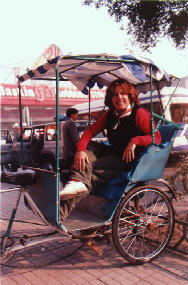 Elisabeth Sherwin sits in the modern equivalent of yester year's
Elisabeth Sherwin sits in the modern equivalent of yester year'srickshaw before one of the icons of western civilization -- a
Baskin Robbin's ice cream parlor.
BEIJING -- "Red China Blues" by Jan Wong (Doubleday/Anchor, 1996) is a fascinating book and it's this book that I'd recommend if someone asked me what to read for a snapshot of China's recent history.
Wong, a Canadian-born Chinese woman, has the advantage here. She came to China at age 19 in 1972 at the height of the Cultural Revolution. With all the fervor of youth, Wong was a committed Maoist, a true believer in the righteousness of Mao Zedong Thought and the evils of capitalism.
She was a committed capitalist and a journalist in 1989 when she crouched on the balcony of the Beijing Hotel and watched the People's Liberation Army mow down students and civilians on Tiananmen Square.
Her story is riveting.
In 1972, she was one of two Western students (the other being Erica Jen, a Chinese-American woman) admitted to special studies at Peking University.
"Although I didn't know it at the time, the decision to accept the first two students from the wicked West had been made by Premier Zhou Enlai himself. Erica and I both thought the Cultural Revolution was wonderful. We were willing and eager to spend a year subjecting ourselves to virtually anything the Chinese threw our way."
But while the two lived in the dorms with Chinese roommates, the university otherwise treated them like revolutionary royalty by providing them with tutors, administrators, a cook and a typist -- 40 people in all. The administrators had nothing to do but beat them at ping-pong during the lunch hour.
Wong objected to being given special attention. She wanted to be treated like all the other students, and this included open-door schooling stints at farms and factories. Wong eventually got her wish and was put to work at the Beijing Number One Machine Tool Factory and, later, at a communal farm. Wong was such an enthusiastic proponent of Communism that she even turned in a classmate who once asked her about life in the West, an act she later bitterly regretted.
Mao died in 1976 and his death marked the end of the Cultural Revolution.
"Overnight, every single person I knew made an abrupt ideological switch. Now, everyone told me, the Cultural Revolution had been a bad, bad thing. I felt betrayed, like the victim of a massive practical joke. But from here on in, I promised myself, I would question everything."
During this time, Wong also decided to be true to her Western roots -- and her revolutionary spirit -- by marrying Norman Shulman, the only American draft dodger from the Vietnam War to seek asylum in China.
She returned to China with her husband in 1988 as a journalist for the Toronto Globe (she earned a journalism degree at Columbia).
"In the eight years I had been away, Beijing had changed dramatically," she wrote. "Its population had jumped 50 percent to 11 million. I was not the same either. Eight years as a business reporter had turned me into a professional skeptic."
She was just in time to witness the tragic result of a power struggle in the highest echelons of the Chinese government -- a struggle that ended in the Tiananmen Square massacre. Wong became obsessed with figuring out how many were killed in those several days of struggle. The government said 323. She believes the death toll is closer to 3,000, based partly on a Chinese Red Cross report made a day after the massacre. She believes the exact number will be known one day, but not soon.
Before Wong, her husband and their two children left China at the end of her assignment in 1994, she had written many articles on dissidents, corruption, poverty, drug usage, slave marriages, and capital punishment.
"Even allowing for a tripling of the population since Qing times (1644-1911), Communist China's rulers are far more bloodthirsty than the feudal emperors they replaced," she wrote. Beijing leads the world in per capita executions. In every way, Wong found a country of extremes, of clashes between new and old. It's said that China has changed more in the past two decades than it has in the past two centuries.
A compelling illustration of change came when Wong interviewed Mao's grandson, New World Mao, 23, in his private hospital room in Beijing. He was there watching TV day and night, undergoing a crash diet.
He was, simply, the fattest Chinese person Wong had ever met -- a horribly ironic note considering the widespread starvation his grandfather's reform policies had created.
The friendly New World Mao told Wong he had been invited to study Maoism at a school in Mississippi, but he couldn't remember the name. It didn't matter because the Central Committee wouldn't let him go.
"My head was reeling. Mao's grandson a couch potato? Mao's grandson dreaming of studying Maoism in the States? Mao's grandson a prisoner of communism? So the dynasty of Mao Zedong had come to this. And to think that I originally came to China as a Maoist."
 Elisabeth Sherwin sits in the modern equivalent of yester year's
Elisabeth Sherwin sits in the modern equivalent of yester year's
Elisabeth Sherwin's first column about "Red China Blues"
by Jan Wong Doubleday/Anchor,
Copyright © 1996
can be found in "'Red China Blues' recounts story of
changing China," the November 3, 1996
PRINTED MATTER column.
Elisabeth's follow up column and another photo from China
can be found in "'Red China Blues,' book discussion
causes tempest at Peking University" the November 10, 1996,
PRINTED MATTER column.